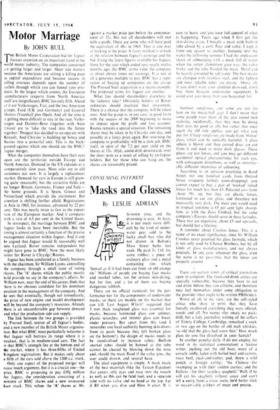Motor Marriage
By JOHN BULL
THE British Motor Corporation bid for Jaguar focuses attention on an important trend in the world motor industry. The companies concerned are getting larger and larger. Sheer size matters because the Americans are setting a killing pace in capital expenditure and because success in veiling overseas depends upon the number of outlets through which you can funnel your pro- ducts. In the league which counts, the European manufacturers (exports from North America itself are insignificant), BMC lies only fifth. Ahead of it are Volkswagen, Fiat, and the two American groups, Ford (UK and Germany) and General Motors (Vauxhall plus Opel). And all the time it is getting more difficult to stay in the race. Volks- wagen and Daimler-Benz (together with Auto Union) are to 'take the road into the future together.' Peugeot has decided to co-operate with Renault. And Chrysler is building up Simca and Rootes into a powerful unit. This is the back- ground against which one should see the BMC/ Jaguar merger.
What the companies themselves have their eyes upon are the territories outside Europe and North America. Demand in the US expands at a comparatively slow pace. Most sales are to old customers not new. It is largely a replacement market. Demand for cars in Europe is still grow- ing quite reasonably but the attractive fields are no longer Britain, Germany, France and Italy— the home grounds. It is Spain, Greece and Switzerland which provide the excitement. But attention is shifting further afield. Registrations in Asia in 1965, for instance, advanced by 22 per cent. This was nearly twice as fast as the expan- sion of the European market. And it compares with a rate of 4.5 per cent in the United States.
In retrospect, the marriage between BMC and Jaguar looks to have been inevitable. But the liming is almost certainly a function of the precise management situation within Jaguar. And it can be argued that Jaguar would fit reasonably well into Leyland. Rover remains independent but might have gone to BMC. Now the most likely suitor for Rover is Chrysler/Rootes.
Jaguar has been conducted as a family business with the chairman, Sir William Lyons, controlling the company through a small issue of voting shares. The 'A' shares which the public mostly hold provide no say in the company's affairs. Sir William now, near the end of his career, finds that there is no obvious candidate for his dominant position in the management of the company. And he sees that eventually, though not immediately, the price of new engine and model development will be beyond the company's resources. Already there is an uncomfortable gap between demand and what the production side can supply.
The link between the two groups is provided by Pressed Steel, source of all Jaguar's bodies, and a new member of the British Motor organisa- tion. But what BMC must particularly welcome is that Jaguar will buttress its range where it is weakest, that is in medium-sized cars. The fact is that BMC's strength lies at the bottom end of the market, where it has three-fifths of United Kingdom registrations. But it makes only about a fifth of the cars sold above the 1200 c.c. mark.
Only one aspect of the proposed merger will cause much argument, but it is a crucial one—the price. BMC is proposing to pay £181 million for Jaguar, the consideration consisting of a mixture of BMC shares and a new unsecured loan stock. This values the 'A' shares at Ms. against a market price just before the announce- ment of 32s. But not all shareholders will exit with a profit. There arc some who will have paid the equivalent of 48s. in 1963. That is one way of looking at the price. A fairer method is to look at the relation between Jaguar's earnings and the bid. Using the latest figures available for Jaguar, those for the year which ended very nearly twelve months ago, the BMC terms value the company at about eleven times net earnings. It is not at all a generous multiple to pay. BMC has a repu- tation of buying up companies on the cheap. The Pressed Steel acquisition is a recent example. The proposed terms for Jaguar ,are another.
What line should shareholders elsewhere in the industry take? Obviously holders of Rover ordinaries should maintain their ins estment. There is a chance that the company will be taken over. And the group is, in any case, in good form with the success of the 2000 beginning to make an impact upon the profit and loss account. Rootes remains a special situation. The remaining shares may be taken in by Chrysler one day, and possibly at a fancy price again. But returning the company to profitability will be a slow job. BMC itself, in spite of the 7.2 per cent yield on the Mares at 13s. 101d., could drift downwards over the short term as a result of selling by ex-Jaguar holders. But for those who can hang on, the shares are reasonably priced.






























 Previous page
Previous page